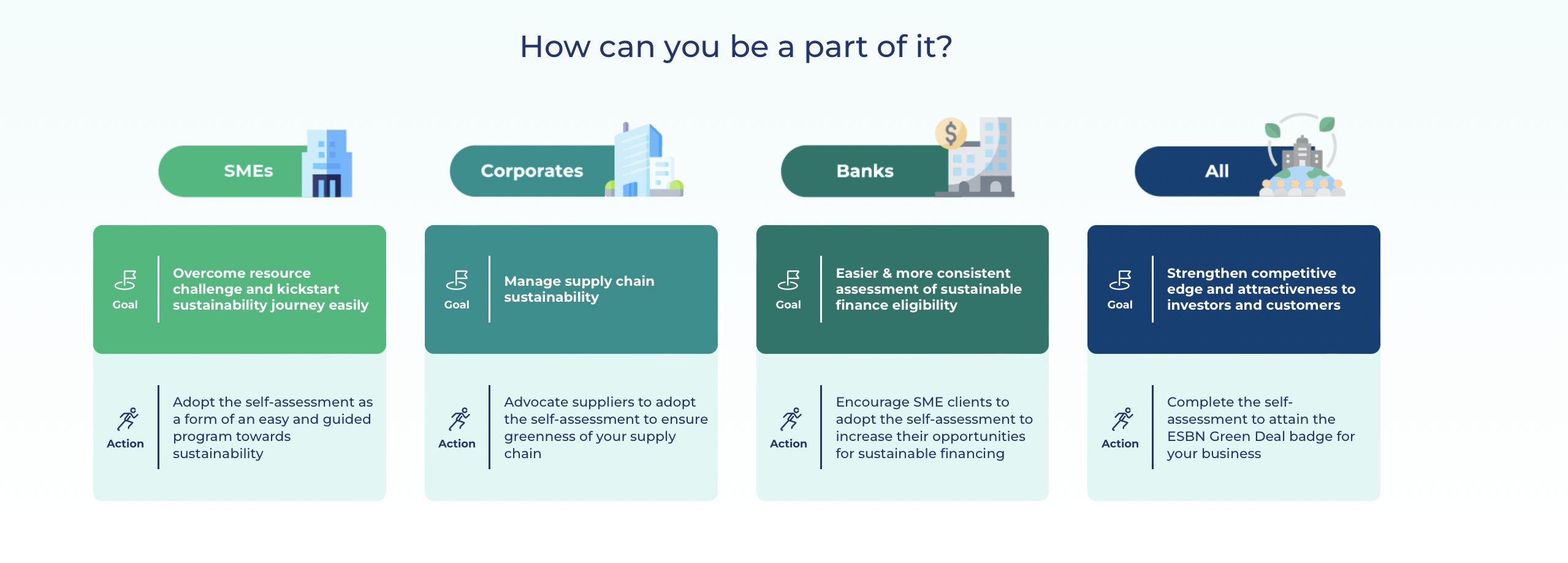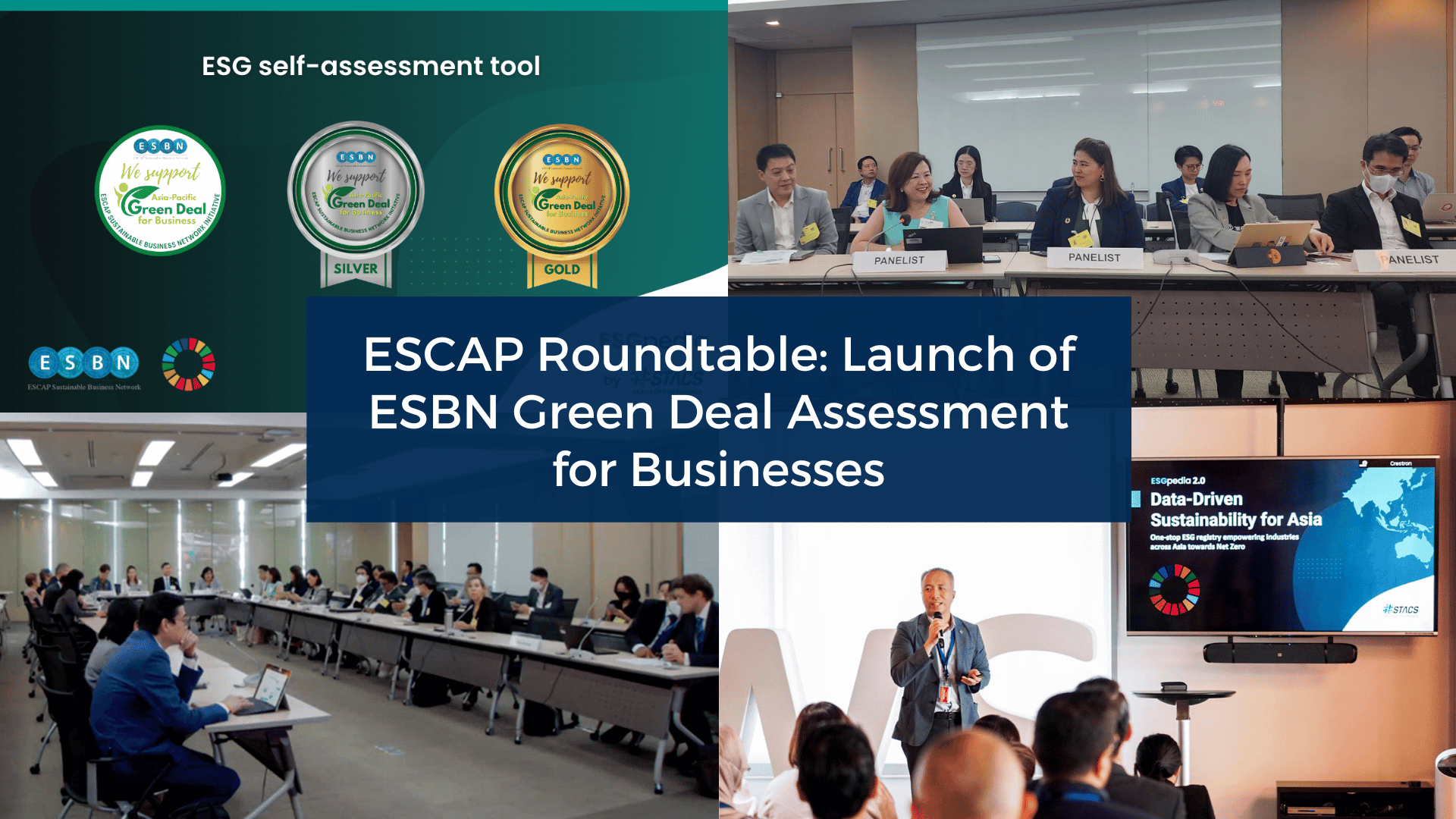It was an honour to officially unveil the ESCAP Sustainable Business Network (ESBN) Asia-Pacific Green Deal digital assessment for Businesses at the United Nations Conference Centre in Bangkok at the 79th session of the Economic and Social Commission for Asia and the Pacific (ESCAP).
“Businesses, large and small, need to take action.” stated Dr George Lam, Chair of ESBN, recognizing the pressing setbacks in the region in two critical Sustainable Development Goals (SDGs): Climate Action (SDG 13) and Responsible Consumption and Production (SDG 12). With the Asia-Pacific region still home to 6 of the top 10 global carbon emitters, it is evident that progress remains stagnant.
To address these challenges, coupled with the lack of necessary resources for SMEs and mounting pressure from EU and US regulators, the launch of the digitalized self-assessment tool marks a significant step forward in accelerating climate action in the region. Free for corporates and SMEs, the digital assessment empowers businesses and fosters coordination between the public and private sectors, driving sustainable transformation.
Collaborative Efforts Needed to Drive Sustainability in Asia
Esther An, the Chief Sustainability Officer of City Developments Limited, further urged entrepreneurs to actively engage with stakeholders to address the critical challenge of greenhouse gas emissions reduction and transition towards sustainability. Her calls underscore the significance of collective action and partnership in driving positive change.
How Banks are Accelerating Green Finance in Asia
Efforts to accelerate green finance in Asia were witnessed through the concerted initiatives of Thailand banks, ADB, and EGAT. Takerng Osirichaivet from Kasikornbank highlighted the importance of sector cooperation and aligning efforts towards sustainable development. Banks are a key link in facilitating the adoption of sustainable practices and innovative green products in the market.
Launch of the ESCAP Business Sustainable Network (ESBN) Asia-Pacific Green Deal Digital Assessment on STACS ESGpedia
By completing the self-assessment, businesses will be awarded an ESBN Asia-Pacific Green Deal badge, to showcase their commitment to sustainability to potential customers, investors, and financiers, strengthening their competitive edge across Asia.
To do so, corporates and SMEs need to only fill up at least 2 of these 5 pillars in the assessment to be eligible: green energy, infrastructure, finance, innovation, and circular economy. Businesses can leverage the data-driven assessment to explore corporate sustainability strategies after conducting carbon calculations. By considering the carbon footprint of their operations and products, businesses can also identify opportunities for resource optimization and waste reduction, offering enhanced competitiveness amongst their stakeholders.
Within ESBN, a dedicated circular economy taskforce supports businesses by leveraging the collective expertise and resources of network participants. This holistic approach ensures that businesses contribute to sustainable development goals while fostering economic growth and resilience in the Asia-Pacific region.
Complete the self-assessment here to attain your Green, Silver, or Gold ESBN Asia-Pacific Green Deal Badge for greater recognition and visibility of your business’ sustainability efforts amongst potential customers, investors, and financiers. For further information and a detailed step-by-step guide, check out the 3-min video tutorial and walk-through here!
ESGpedia 2.0 Showcase – Data-driven Sustainability for Asia’s Net Zero Goals
“It’s no longer a choice between sustainability and profitability.”
During STACS’s semi-annual showcase on 23 May 2023, Benjamin Soh, Founder and Managing Director of STACS, shared the importance of sustainability in today’s business landscape. As financial institutions are increasingly recognizing the interdependency between these two goals, it is strategically imperative for businesses to understand and embrace sustainable processes. To thrive and remain competitive in the current market environment, aligning themselves with sustainability practices allow corporates and SMEs to be more appealing to consumers and investors and even take advantage of the lower interest trends on green loans.
Scaling Sustainable Finance using Data
“This is the essence of the ESBN Asia-Pacific Green Deal program; where ultimately, we want sustainability to start all the way at the upstream.” By addressing sustainability at every stage of the value chain, from SMEs all the way to financial institutions, the program enables capacity building and collaboration, driving widespread impact. The digital self-assessment tool seeks to empower businesses to kickstart their sustainability journey and chart their pathway towards net zero. This, in turn, cultivates corporate champions who will lead the Asia-Pacific region in fulfilling its green goals.
“We are not trying to create a new standard. We are aligning with existing standards and frameworks so much so that if a company follows through this program, whatever they have already done would be mappable to other reporting standards.” ESGpedia partners with a multitude of certification bodies, organizations, and disclosure platforms including TGO (Thailand Greenhouse Gas Management Organization) and global environmental disclosure platforms like CDP (Carbon Disclosure Project). These partnerships strengthen the platform’s capabilities in areas such as greenhouse gas management and environmental disclosure.
In addition to this, the ESBN Green Deal self-assessment platform incorporates localized conversion factors, ensuring accuracy and facilitating meaningful comparisons. By working closely with local partners and aligning with local policies, the platform fosters a conducive environment for sustainable practices among businesses in the APAC region.
Learn more and sign up now to attain your Green, Silver, or Gold, ESBN Green Deal badge here.
Watch the recap of the United Nations ESCAP Roundtable on 17th May 2023 here.
Incentivizing Suppliers to Adopt the ESBN Green Deal Self-Assessment
During the showcase, Benjamin acknowledged a crucial factor in addition to technology, stating, “Technology is not quite enough. Incentive mechanisms are important too.” In response to concerns raised by panellists, he highlighted the ESBN Badges as a means of recognition and incentivization for corporates and SMEs.
The roundtable attendees, including banks and corporates, unanimously agreed on the need for an all-hands-on-deck approach to drive the success of the initiative. This consensus reflects the understanding that collaboration and collective efforts are vital in ensuring the widespread adoption of sustainable practices across supply chains in Asia, so that we can move further and faster together in the race against climate change.
The Future of Sustainable Finance in Asia

Spearheading the ESBN Asia-Pacific Green Deal for the textile and fashion sector is Teo Garments, who shared on the need of decarbonising their supply chain and how STACS’s ESGpedia facilitated in aggregating all their sustainability programs and achievements such as LowCarbonSG onto a single platform.
“[The ESBN Green Deal digital assessment on] ESGpedia is very easy to fill in […]. It is data based on existing electricity bills, how much you are consuming and it is all data that can be verified […]. ESGpedia is a platform for us to present our data so that it is easy to understand.” shared Song Qing Tan, Compliance and Sustainability Executive at Teo Garments.
Championing a Unified Sustainability Platform for Businesses in Asia-Pacific
“Any platform that brings data together is good.” claimed Susan Olsen, CFA, Senior Investment Specialist, Financial Institutions, Mekong Region at ADB. Her remarks capture the significance of consolidated data and its value in promoting sustainability. Susan’s anticipation shines through as she states, “I’m looking forward to this being the main ESG platform in the world,” displaying the potential of the platform to become a leading force in ESG reporting and assessment, contributing to the advancement of sustainable finance in the Asia-Pacific region and beyond.
Strengthen your competitive edge today and learn how you can sign up to attain your ESBN Green Deal badge here.




